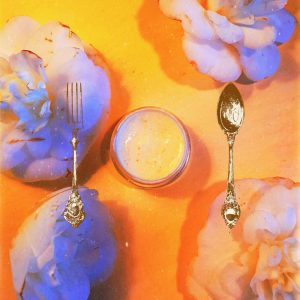Eat your skincare
Blog › Skin › Eat your skincare

No, we don’t actually mean you should start eating your moisturisers and serums.
“Eat your skincare” is a concept that is the basis of the Ayurvedic principle that food is medicine. So why can’t food be skincare too? By incorporating more nutrient-rich foods into your diet, it can help promote healthy skin.
We all know new vitamins, supplements and collagen drinks are always being pushed in the health & beauty market as new trendy quick fixes to better skin, but by adding more fresh foods into your diet everyday for your specific needs, your skin can actually benefit in maybe a less trendy way.
Your body is designed to absorb nutrients from food sources, so why over complicate it? The need for vitamins as supplements comes into play when you aren’t receiving all the vitamins and minerals you need from your diet, or of course for some people who may require extra due to health reasons.
Ultimately, fatty fish, leafy greens, nuts, fruits, and vegetables are known to promote good health and can be absorbed better than some packaged vitamins.
With the skincare market always ever growing, it has gained a huge cult following as skincare isn’t just skincare anymore, its so much more to do with beauty routines and self care. Although of course foods can’t substitute great products such like SPF and cleansers, the direct link between internal health and your skin is sometimes forgotten or overlooked.
This can be especially true when you’re experiencing terrible breakouts all of a sudden after finally perfecting your skincare routine, so frustrating! Then the search for what you could be doing wrong, or new stronger anti acne treatments can leave you more confused and overwhelmed than when you started.
Dermatologists usually recommend you keep your skincare simple to avoid irritating the skin. So what can you do?
Skin concerns such as acne can often be aggravated by stress, and higher levels of cortisol in the body. This increases blood glucose levels and causes inflammation in your body, which in turn increases the production of sebum in the skin and more clogged pores. Inflammation and excess sebum can lead to more acne breakouts.
Stress isn’t the only factor that can cause spikes in blood sugar levels, food can too. These are called highly glycemic foods, meaning foods that spike your blood sugar levels in a shorter amount of time. Foods that are known to raise your blood sugar quickly include; white bread, white rice, sugary foods like cereal, white potatoes, doughnuts or other pastries, and sugary drinks such as milkshakes. Dairy products have also been linked to acne, as an inflammatory causing food.
Enough of the bad news and what you shouldn’t do. The good news is small studies have shown that following a low-glycemic diet may actually reduce the amount of acne you have by reducing the amount of inflammation in the body. Low-glycemic foods include most fresh vegetables, fresh fruits, beans, and steel-cut oats. So by making small changes into your diet everyday, by adding fresh fruits and vegetables your skin may change for the better!
Still, this information may seem obvious, everyone is always telling you to eat more fruits and vegetables, but which ones? In Ayurveda the general rule is to eat according to the seasons and your personal needs, certain herbs are also included for additional medicinal properties when taken internally and applied on the skin.
One great example is turmeric, known for its anti-inflammatory and anti-bacterial properties, turmeric or haldi can be included in food and drink and applied as a face mask to the skin to help with inflammation and acne.
1. Vitamin A
The most common topical treatment for acne are Retinoids (Vitamin A), proving that Vitamin A is important in treating acne. In fact, this is the only vitamin that efficiently combats all acne causing factors and prevents over-secretion of sebum.
Source: Foods rich in Vitamin A include carrots, mangoes, papayas, sweet potato, pumpkin, green leafy vegetables, and liver.
2. Vitamin C
Though Vitamin C’s direct role in preventing acne is still under research, it is known for being a powerful antioxidant. Consuming foods rich in Vitamin C can prevent acne scars and quicken the acne healing process.
Source: Vitamin C rich foods include citrus fruits, lemon, amla, kiwi, guavas, and broccoli.
3. Vitamin E
Vitamin E is also a potent antioxidant and plays a significant role in treating acne. It helps in preventing acne scars and promotes skin regeneration. Including Vitamin E in your diet can help reduce blocked pores and inflammatory acne.
Source: Vitamin E sources include sunflower and soybean oil, wheat germ oil, almonds, peanuts, and avocados.
4. Zinc
The anti-inflammatory properties of zinc make it an important addition to the diet for acne. It prevents the proliferation of P. acnes bacteria and also lowers the rate of sebum secretion. Zinc is also known to reduce acne scars and improve the overall condition of your skin.
Source: Foods rich in Zinc include legumes, nuts, wholegrains, mushrooms, asparagus, pomegranate.
5. Omega 3 Fatty Acids
New research indicates that adding Omega 3 fatty acids to your diet is a great way to fight acne. Omega 3 exhibits anti-inflammatory properties that help reduce acne inflammations. Moreover, Omega 3 can help balance your hormones that affect the level of sebum secretion thus putting a check on two of the main pathogenic factors that cause acne.
Source: Foods containing Omega 3 fatty acids are flax seeds, walnuts, salmon, eggs and mackerel.
Ayurvedic practices also involve herbal mixtures which can help with certain skin concerns, leave a comment below if you found this information useful, and if you’d like to read more about Ayurvedic herbs & herbal teas to help with skin health.